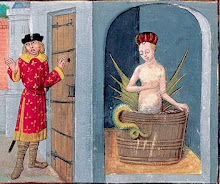I think there is a tendency among those of us who care deeply about improving the historical accuracy of Renaissance faire costuming to be frustrated with the slow pace at which we are able to encourage the change we wish to see. What do we do at established events with established communities, where historicalness within the theatrical framework is not discouraged, but where the minimum standard is more theatrical than historical, or where there simply are not standards at all?
I think it is important to remember that it has taken us 50 years to reach where we are. I was looking at pictures from the very first Renaissance faire started by the Pattersons. If you've never seen them, or if you haven't looked at them for a while, go check them out. The costuming is about what I expect from patrons of our current faires. In the 50 years since that first faire, some faires have gotten better, some have gotten worse, some look about the same. My point is this: it has taken us 50 years to get here.
To terribly misuse the words of two brilliant individuals, Mahatma Ghandi and Max Weber, I think the best way to improve the historicalness of faire costuming is to be the change we want to see, and to realize that, like politics, it will be the slow boring of hard boards and that if we seek to do it we must risk our own souls. Faire fashion, like all fashion, follows trends. When actors are replacing their costumes, of course they'll make or buy what they admire on their friends. Not everyone is going to be as committed to research as we are, as much as we may wish it were so. But if we look good, then at least some of those people will be imitating us, and when they express interest in what we're wearing, we can share our research with them. I wouldn't mind seeing a faire populated entirely by cast members who imitated someone else and did no research of their own as long as that someone else had done the research.
Another brilliant, if slightly less well known person, Elizabeth Stewart Clark of the Civil War reenacting community, describes her view on historical accuracy in reenactment as "progressive". She says, "A person with a progressive mindset endeavors to recreate, as closely as possible, the lives and circumstances of the past. This applies to material culture, as well as to internal knowledge, and it’s a process, not an 'arrival.'"
You'll never get everyone on board, and you'll certainly lose scores of people if you try to force it all at once at an established event. But you can help make historical accuracy (or at least improvement) less threatening and more appealing. Check out her piece The Missionary Position: Proselytizing for Progressives or a Brief Guide to Polite Progression. It's aimed at mid-19th century impressions, but the lessons are applicable to any time period.
The slow boring of hard boards. Hey, I'm willing to risk my soul. How 'bout you?
Printable Cozy Fall Bookmarks
3 weeks ago
